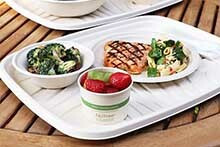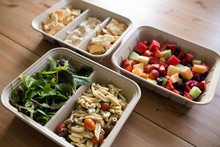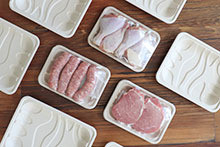Food & Lunch Trays
Compostable fiber food and lunch trays are a perfect way to serve to-go food and meals. Single and multiple compartments are available with a variety of sizes and lid options. Also check out our compostable utensils and our full line of take out containers. Free Samples, Wholesale Pricing & FREE Shipping +$50!
Food & Lunch Trays FAQs
Are Good Start Packaging lunch trays compostable or eco-friendly?
Yes, Good Start Packaging’s lunch trays include certified compostable and eco-friendly materials such as plant fiber trays and compostable paper trays designed to reduce environmental impact.
What are the main categories of trays available on the ‘Food & Lunch Trays’ page?
The page highlights categories including Lunch Trays, Fiber Catering Trays, Paper Food Trays, Charcuterie Trays, and Meat & Produce Trays.
Why choose compostable lunch trays over traditional plastic or foam?
Compostable trays support sustainability by breaking down naturally instead of filling up landfills. Traditional plastic foodservice packaging contributes significantly to waste, whereas compostable alternatives reduce environmental footprint.
Are compostable lunch trays safe for hot and cold foods?
Yes, compostable lunch trays are designed to handle both hot and cold foods without leaking or warping. Fiber-based trays in particular are durable, grease-resistant, and microwave-safe, making them a versatile eco-friendly alternative to plastic or Styrofoam.
How long do compostable trays take to break down in compost facilities?
Most compostable lunch trays break down within 2 to 4 months in commercial composting facilities, depending on conditions like heat, moisture, and microbial activity. This is much faster than plastic trays, which can take hundreds of years to degrade.
Can compostable food trays be recycled if composting is not available?
Compostable trays should not be placed in regular recycling bins, as they are designed to decompose in a composting environment, not be recycled like traditional paper or plastic. If composting is not available locally, disposing of them in the trash is the next option, but composting is always the most sustainable choice.
Compostable fiber food and lunch trays are a perfect way to serve to-go food and meals. Single and multiple compartments are available with a variety of sizes and lid options. Also check out our compostable utensils and our full line of take out containers. Free Samples, Wholesale Pricing & FREE Shipping +$50!
Food & Lunch Trays FAQs
Are Good Start Packaging lunch trays compostable or eco-friendly?
Yes, Good Start Packaging’s lunch trays include certified compostable and eco-friendly materials such as plant fiber trays and compostable paper trays designed to reduce environmental impact.
What are the main categories of trays available on the ‘Food & Lunch Trays’ page?
The page highlights categories including Lunch Trays, Fiber Catering Trays, Paper Food Trays, Charcuterie Trays, and Meat & Produce Trays.
Why choose compostable lunch trays over traditional plastic or foam?
Compostable trays support sustainability by breaking down naturally instead of filling up landfills. Traditional plastic foodservice packaging contributes significantly to waste, whereas compostable alternatives reduce environmental footprint.
Are compostable lunch trays safe for hot and cold foods?
Yes, compostable lunch trays are designed to handle both hot and cold foods without leaking or warping. Fiber-based trays in particular are durable, grease-resistant, and microwave-safe, making them a versatile eco-friendly alternative to plastic or Styrofoam.
How long do compostable trays take to break down in compost facilities?
Most compostable lunch trays break down within 2 to 4 months in commercial composting facilities, depending on conditions like heat, moisture, and microbial activity. This is much faster than plastic trays, which can take hundreds of years to degrade.
Can compostable food trays be recycled if composting is not available?
Compostable trays should not be placed in regular recycling bins, as they are designed to decompose in a composting environment, not be recycled like traditional paper or plastic. If composting is not available locally, disposing of them in the trash is the next option, but composting is always the most sustainable choice.






